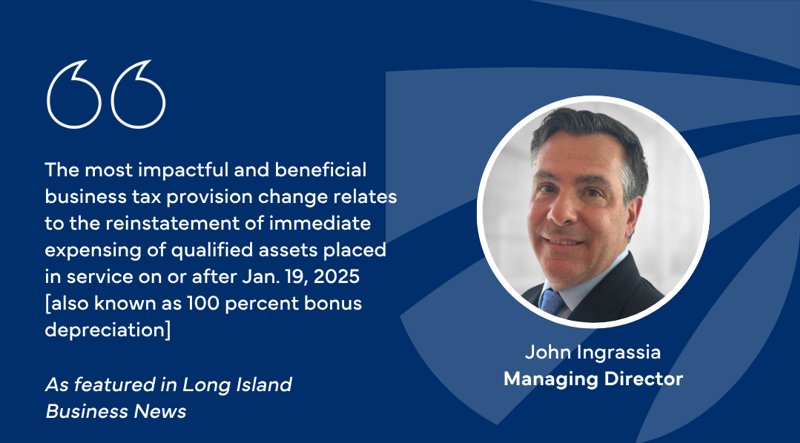The “Big, Beautiful Bill” signed into law this month by President Trump promises tax relief for tip workers and small businesses, while ending clean energy incentives—and leaves many details as questions to be answered later on.
The result: Tax policies established in 2017 will now continue, but even deeper cuts some had hoped for did not pan out.
Considered to be President Trump’s signature legislation starting his second term, the bill—in addition to the tax and economic provisions—also provides significant new spending for military and immigration enforcement. Additionally, it introduces significant new work and reporting requirements for Medicaid which analysts believe will reduce spending on the program by almost
$1 trillion.
Dubbed the “Big, Beautiful Bill” by President Trump, it passed both houses of Congress this month along party lines. Tax and accounting experts consider, among its highlights:
One hundred-percent bonus depreciation returns: Businesses can now immediately expense qualified assets (computers, machinery, furniture, vehicles) placed in service after January 19, 2025, rather than depreciating them over time. This provides significant tax savings and better cash flow alignment for capital investments.
SALT deduction cap increased: The State and Local Tax (SALT) deduction limit increases from $10,000 to $40,000 for taxpayers with income up to $500,000, effective 2025 through 2029. This particularly benefits Long Island residents with high property taxes, though it reverts back to $10,000 in 2030.
No tax on tips and overtime: New above-the-line deductions facilitate up to $25,000 for qualified tips and $25,000 for overtime pay (joint filers) for tax years 2025-2028, with phase-outs starting at $150,000-$300,000 income levels. This provides significant tax relief for service industry workers.
“The most impactful and beneficial business tax provision change relates to the reinstatement of immediate expensing of qualified assets placed in service on or after Jan. 19, 2025 [also known as 100 percent bonus depreciation],” said John Ingrassia, managing director of the Long Island tax practice at the accounting firm UHY.
“Another significant change relates to the immediate expensing of domestic research costs, which had been previously capitalized and amortized over five years,” Ingrassia said.
He added: “Both provisions are permanent, which will facilitate taxpayers to better plan for tax savings in the foreseeable future.”
As a result of changes to business deductions permitted in the law, businesses may need to consider reconsidering recent expenditures.
Read the full article published by Long Island Business News.
Have a Question?
Fill out the form to speak with one of our professionals.
By submitting this form, you agree to be contacted by UHY.







